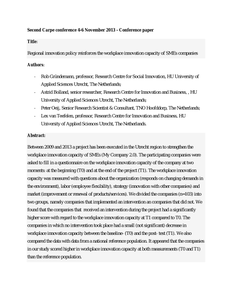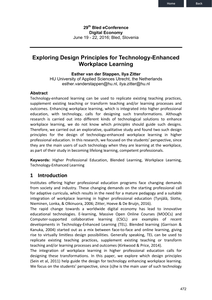Change has become continuous, and innovation is a primary approach for hospitality, i.e., hotel companies, to become or remain economically viable and sustainable. An increasing number of management researchers are paying more attention to workplace rather than technological innovation. This study investigates workplace innovation in the Dutch hotel industry, in three- and four-star hotels in the Netherlands, by comparing them to other industries. Two samples were questioned using the Workplace Innovation survey created by the Dutch Network of Social Innovation (NSI). The first was conducted in the hospitality industry, and these data were compared with data collected in a sample of other industries. Results suggest that greater strategic orientation on workplace innovation and talent development has a positive influence on four factors of organizational performance. Greater internal rates of change, the ability to self-organize, and investment in knowledge also had positive influences on three of the factors—growth in revenue, sustainability, and absenteeism. Results also suggest that the hospitality industry has lower workplace innovation than other industries. However, no recent research has assessed to what degree the hospitality industry fosters workplace innovation, especially in the Netherlands. Next to that, only few studies have examined management in the Dutch hotel industry, how workplace innovation is used there, and whether it improves practices.
DOCUMENT

Animation series explaining protocol and approach of the Innovation Workplace (fieldlab) powerful SME's
MULTIFILE
This is the introduction to the special issue of World Review of Entrepreneurship, Management and Sustainable Development (WREMSD) dedicated to workplace innovation and social innovation related to work and organisation. As technological and business model innovations alone are not sufficient to enhance opportunities for businesses and employment, awareness is rising that better use should be made of human talents and new ways of organising and managing. In order to make working environments more receptive for innovation, and to enable people in organisations to take up an entrepreneurial role as intrapreneurs, a shift towards workplace innovation can be observed. Workplace innovation is complementary to technological and business model innovation, and a necessary ingredient for successful renewal, in that it addresses a type of management that seeks collaboration with employees through dialogue and employee engagement.
DOCUMENT

To promote workplace learning for staff as well as students, a partnership was formed between a residential care organisation for older people and several nursing faculties in the Netherlands. This partnership took the form of two care innovation units; wards where qualified staff, students and nurse teachers collaborate to integrate care, education, innovation and research. In this article, the care innovation units as learning environments are studied from a student perspective to deepen understandings concerning the conditions that facilitate learning. A secondary analysis of focus groups, held with 216 nursing students over a period of five years, revealed that students are satisfied about the units' learning potential, which is formed by various interrelated and self-reinforcing affordances: co-constructive learning and working, challenging situations and activities, being given responsibility and independence, and supportive and recognisable learning structures. Time constraints had a negative impact on the units' learning potential. It is concluded that the learning potential of the care innovation units was enhanced by realising certain conditions, like learning structures and activities. The learning potential was also influenced, however, by the non-controllable and dynamic interaction of various elements within the context. Suggestions for practice and further research are offered.
LINK
Between 2009 and 2013 a project has been executed in the Utrecht region to strengthen the workplace innovation capacity of SMEs (My Company 2.0). The participating companies were asked to fill in a questionnaire on the workplace innovation capacity of the company at two moments: at the beginning (T0) and at the end of the project (T1). The workplace innovation capacity was measured with questions about the organization (responds on changing demands in the environment), labor (employee flexibility), strategy (innovation with other companies) and market (improvement or renewal of products/services). We divided the companies (n=103) into two groups, namely companies that implemented an intervention an companies that did not. We found that the companies that received an intervention during the project had a significantly higher score with regard to the workplace innovation capacity at T1 compared to T0. The companies in which no intervention took place had a small (not significant) decrease in workplace innovation capacity between the baseline- (T0) and the post- test (T1). We also compared the data with data from a national reference population. It appeared that the companies in our study scored higher in workplace innovation capacity at both measurements (T0 and T1) than the reference population
DOCUMENT

A B S T R A C T Background: Approximately 4 years ago a new concept of learning in practice called the ‘Learning and Innovation Network (LIN)’ was introduced in The Netherlands. To develop a definition of the LIN, to identify working elements of the LIN in order to provide a preliminary framework for evaluation, a concept analysis was conducted. Method: For the concept analysis, we adopted the method of Walker and Avant. We searched for relevant publications in the EBSCO host portal, grey literature and snowball searches, as well as Google internet searches and dictionary consults. Results: Compared to other forms of workplace learning, the LIN is in the centre of the research, education and practice triangle. The most important attributes of the LIN are social learning, innovation, daily practice, reflection and co-production. Often described antecedents are societal developments, such as increasing complexity of work, and time and space to learn. Frequently identified consequences are an attractive workplace, advancements of expertise of care professionals, innovations that endorse daily practice, improvement of quality of care and the integration of education and practice. Conclusions: Based on the results of the concept analysis, we describe the LIN as ‘a group of care professionals, students and an education representatives who come together in clinical practice and are all part of a learning and innovation community in nursing. They work together on practice-based projects in which they combine best practices, research evidence and client perspectives in order to innovate and improve quality of care and in which an integration of education, research and practice takes place’. We transferred the outcomes of the concept analysis to an input-throughput-output model that can be used as a preliminary framework for future research.
DOCUMENT

From the article: "Abstract, technology-enhanced learning can be used to replicate existing teaching practices, supplement existing teaching or transform teaching and/or learning process and outcomes. Enhancing workplace learning, which is integrated into higher professional education, with technology, calls for designing such transformations. Although research is carried out into different kinds of technological solutions to enhance workplace learning, we do not know which principles should guide such designs. Therefore, we carried out an explorative, qualitative study and found two such design principles for the design of technology-enhanced workplace learning in higher professional education. In this research, we focused on the students' perspective, since they are the main users of such technology when they are learning at the workplace, as part of their study in becoming lifelong learning, competent professionals."
DOCUMENT

Paperbijdrage conferentie EARLI SIG 14, 11-14 september 2018, Genève Although professional performance at the workplace is essential in VET, little is known about what educators do when assessing students’ performance. This study aims to explore how workplace educators inform their judgements of students’ performance by looking at strategies and potentially influencing factors.
DOCUMENT

Posterbijdrage conferentie EARLI SIG 14, 11-14 september 2018, Genève Although literature shows the important supportive role of experienced colleagues to stimulate novices’ workplace learning, the question of how this support is provided is usually answered in general terms (e.g. Mikkonen et al. 2017; Tynjälä 2008). Therefore, this study aims to explore how members of vocational communities, both individually and as a collective, enact specific pedagogic practices to contribute to novices’ learning. The systematic literature review that will be presented in the interactive poster session is the first study of a PhD project and provides an overview of situational pedagogic practices which attempt to support novices’ learning at the workplace.
DOCUMENT

Purpose – The hospitality industry creates a distinctive context in which learning takes place. The industry’s international perspective and large globalisation play an important role in learning, as well as the operational and structural features that give meaning to learning and development in the hospitality industry. This explorative research therefore studies the relation between workplace learning and organisational performance in the Dutch hospitality industry. Design/methodology/approach – The qualitative research is done through 15 in-depth interviews with general managers and HR managers of Dutch hotels with three or more stars and at least ten employees. Findings – It can be concluded that there is a relation between workplace learning and organisational performance in the hospitality industry, as the participants in this research and the literature both mention workplace learning enhances organisational performance. Originality/value – Little research has been done on learning and organisational performance specifically, in the (Western) hospitality industry. This research therefore focusses on HRD and studies the influence of workplace learning on organisational performance in the Dutch hospitality industry.
DOCUMENT
